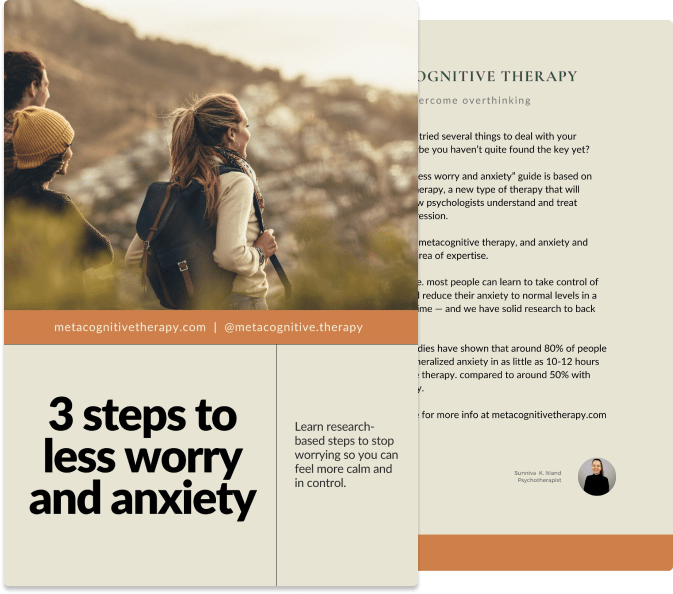How meta-awareness (the recognition of your thought patterns) impacts mental health

Download our best tips on reducing anxiety and worrying
Learn three powerful metacognitive therapy steps to stop the worry cycle, reduce anxiety, and feel calmer in everyday life.


If you're struggling with anxiety, overthinking, or mental health issues, a key step in improving your emotional wellbeing is becoming more conscious of how your own thinking patterns and mental activities are affecting you.
Many people have limited awareness of how their mind works and how their thought patterns are affecting them. As a result, they often react to negative thoughts in a way that escalates anxiety and negative feelings, instead of in a way that deescalates. Becoming more aware (increasing meta-awareness), makes it easier to break this cycle.
What is Meta-Awareness?
Meta-awareness is the ability to recognize your own thoughts and cognitive processes, and to notice how they impact your feelings, symptoms, concentration, ability to function, and more. For example, if you dwell a lot on negative thoughts, you'll probably feel more sad and have lower energy. If you worry a lot, you'll feel more stressed and anxious. Overthinking in social situations will make it harder to concentrate and listen to what people are saying. Trying to push thoughts away will make them feel more persistent and intrusive.
Becoming more aware of this will allow you to assess the way you're relating to your thoughts, and the impact it has on you. It also allows you to notice and interrupt mental processes that are affecting you negatively instead of becoming absorbed in them.
Why meta-awareness is important
Meta-awareness allows you to:
- Recognize when you're engaging in unhelpful thought patterns, such as worry, threat monitoring, or rumination.
- Label these patterns and experiences as separate from yourself.
- Implement more effective strategies to manage these patterns to improve your emotional wellbeing.

Download our best tips on reducing anxiety and worrying
Learn three powerful metacognitive therapy steps to stop the worry cycle, reduce anxiety, and feel calmer in everyday life.
Meta-awareness varies between people
People differ in their degree of meta-awareness, and in their ability to increase their meta-awareness. While some people are easily able to notice their thoughts and differentiate between different types of mental events, others struggle to recognize when they're engaging in rumination or other processes that affect them negatively.
For example, people with conditions like depression, social anxiety, and personality disorders more often have low meta-awareness. This makes them less likely to realize how constant threat-monitoring, worrying, and ruminating is negatively affecting their mood, mental health and self-esteem.
It's hard to change a pattern you're not aware of, so one of the first steps in metacognitive therapy is to become more aware of the patterns that are maintaining your mental distress.
Many people simply have some blind spots, and once they notice them, they can change their thinking patterns and behaviours. Others struggle to notice thoughts, and to recognize when they're engaging in rumination or other processes that affect them negatively (such as threat monitoring).
The role of meta-awareness in therapy
Increasing meta-awareness is an integral part of Metacognitive Therapy (MCT). This is because in order to change your thinking style you first need to become more aware of your current style of thinking, and how it is affecting you. When you're able to recognize the responses and processes that are amplifying and perpetuating your mental distress, this allows you to interrupt or change these processes.
To increase meta-awareness, an MCT therapist will ask questions that help you reflect on your thinking style and your beliefs about your thoughts. They will also help you recognize, label, and distinguish between key cognitive processes. For example, by helping you to distinguish between processes that you have no control over (such as spontaneously occurring negative thoughts), and processes that you have control over (such as worrying or ruminating), this helps you not waste your time and energy trying to control things you can't control. Instead, you can focus on modifying the processes that you have control over.
Homework early in treatment can include noticing your trigger thoughts and how you respond to them. You can also start to increase your meta awareness through questions such as:
- How much time do you spend dwelling on your negative thoughts?
- What happens to your mood and energy levels when you ruminate?
- Is the problem having the thought, or is it all the negative thinking that follows?
- Do you sometimes try to stop your negative thinking? What have you tried? How has it worked?
- Does worrying make you feel safe and prepared, or does it make you stressed and anxious?
How it differs from self-awareness
Meta-awareness is different from general self-awareness in a few crucial ways:
Focus: While self-awareness can involve general recognition of specific feelings and thoughts, meta-awareness focuses on recognizing thought patterns and cognitive processes in order to effectively modify them.
Its impact on therapy: Increasing meta-awareness enables you to recognize and interrupt dysfunctional thought patterns, which is central to metacognitive therapy, whereas approaches that focus solely on self-awareness might delve into each specific feeling and situation.
Having a high meta-awareness doesn't mean that you have to constantly observe your thoughts. In fact, constantly monitoring your thoughts can lead to cognitive self-conciousness, and isn't conducive to good mental health. Meta-awareness simply allows you to recognize and catch unhelpful thinking patterns, such as ruminating, so you can interrupt these processes and choose to do something else.
The benefits
Increasing your meta-awareness is helpful because it allows you to recognize and respond to difficult thoughts and emotions in more helpful ways.
Interested in finding out more about how your thought patterns are affecting you? You can learn more about how to get started with MCT here.



